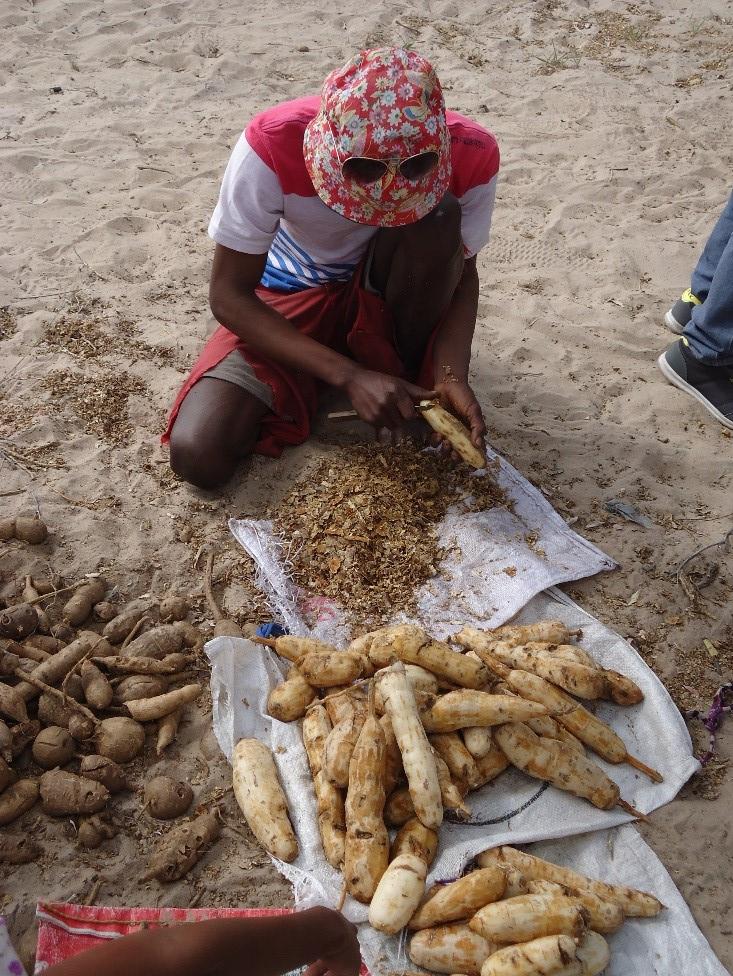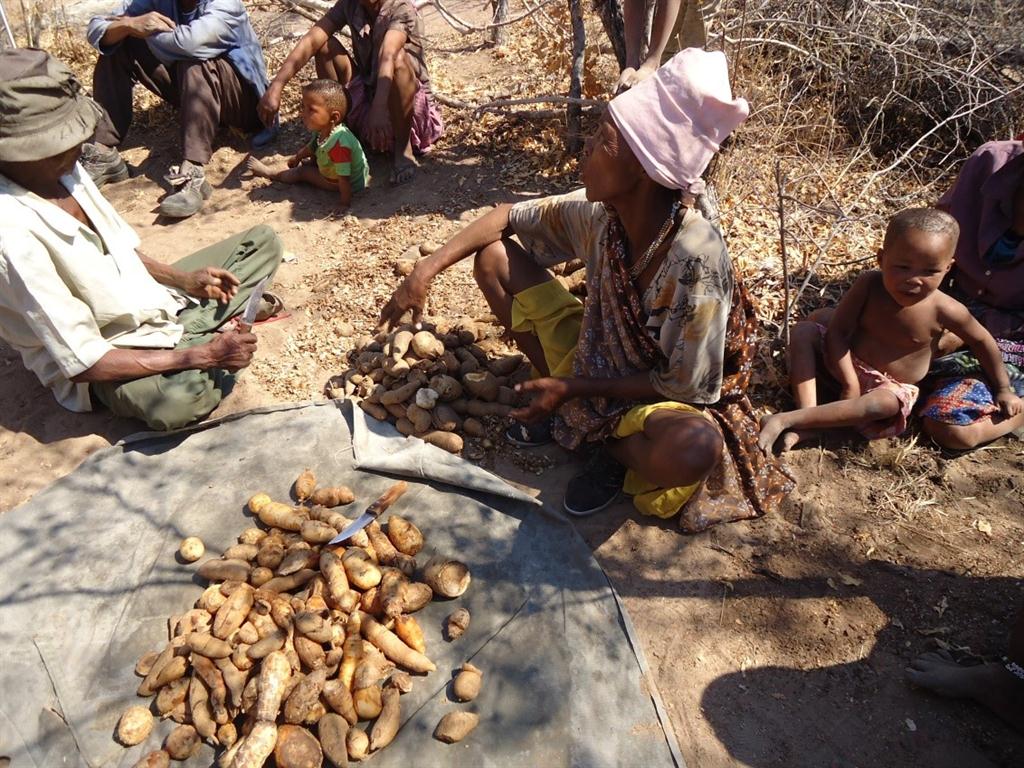Bumper devil's claw harvest
The devil's claw harvesting season saw San communities generate over N$2 million in sales of the sought-after herb.
Conservancies in the Otjozondjupa Region had a bumper devil's claw harvest this year, resulting in a hefty income for the conservancy and its members.
According to a statement issued by the Nyae Nyae and N#a Jaqna conservancies, the harvesting and sale of devil's claw made a significant contribution to the income of harvesters.
The devil's claw plants reacted positively to the good rains that were received in the region early this year.
The rotational harvesting system and sustainable harvesting methods introduced and diligently followed by harvesters allows them to benefit from this method of sustainable harvesting every year.
In the Nyae Nyae conservancy approximately 200 harvesters harvested and sold 18.7 tons of devil's claw, resulting in an income of close to N$1 million for the harvesters. The total projected income to the conservancy will be close to N$ 1.4 million.
In the N#a Jaqna Conservancy about 275 harvesters harvested and sold 21.7 tons of dried devil's claw.
This resulted in close to N$950 000 in cash for harvesters while the total projected income to the conservancy will be in the region of N$ 1.2 million.
An important aspect related to the harvesting and sale of devil's claw is that harvesters, who are from marginalised communities with few other opportunities, earn over 75% of the total income.
The purchase price, negotiated at the beginning of each harvesting season, reflects the price paid for organically certified devil's claw.
This devil's claw is sustainably harvested, quality-controlled, is fully traceable and has been processed and stored in a manner that ensures that quality is assured.
The purchase price of devil's claw increased considerably in 2017, particularly in Nyae Nyae because the conservancy entered into a partnership agreement with the buyer to obtain Fair for Life Certification, a form of Fair Trade certification.
The concept behind Fair for Life certification is that producers from disadvantaged backgrounds can influence their own development by together deciding on meaningful projects that can be adapted to their local conditions.
Fair for Life ensures that organisations and companies are committed to building respectful relationships, ensuring fair working conditions and respecting the environment within and along their supply chains. Consumers are then also able to make informed purchase decisions.
An important factor that contributes to the success of the devil's claw undertakings in both conservancies is the consistency created by having a reliable buyer with proper contracts in place and where everybody involved knows their roles and responsibilities.
Currently both conservancies have contracts with EcoSo Dynamics cc, a local exporter of the product. According to the Managing Director of EcoSo Dynamics, Gero Diekmann, the partnership is important and is built on mutual trust over the last decade.
This has enabled them together with the conservancies to put in place a traceability system whereby each and every bag that is purchased can be traced back to the harvester as well where it was harvested.
Support is currently given to both conservancies in terms of helping them negotiate prices, comply with Organic Certification and Fair for Life guidelines and ensure sustainable harvesting.
This support, implemented by the Nyae Nyae Development Foundation of Namibia, is funded by an EU Climate Change Adaptation grant.
Each year the support is reduced to enable greater independence of the conservancies and improved sustainability of their livelihoods thereby empowering and making the San more and more self-sufficient.
Suitably named the devil's claw because of the sharp and hooked form of its fruit, the devil's claw has been used as a traditional medicine for many years.
Since the 1960s it has been exported as dried raw material to be processed and used in the treatment of rheumatism and arthritic type ailments.
About 90% of the world's devil's claw is found among Namibian communities and it is sold by communities per kilogramme to the buyers before it is processed and sold for great profit outside the country.
STAFF REPORTER
According to a statement issued by the Nyae Nyae and N#a Jaqna conservancies, the harvesting and sale of devil's claw made a significant contribution to the income of harvesters.
The devil's claw plants reacted positively to the good rains that were received in the region early this year.
The rotational harvesting system and sustainable harvesting methods introduced and diligently followed by harvesters allows them to benefit from this method of sustainable harvesting every year.
In the Nyae Nyae conservancy approximately 200 harvesters harvested and sold 18.7 tons of devil's claw, resulting in an income of close to N$1 million for the harvesters. The total projected income to the conservancy will be close to N$ 1.4 million.
In the N#a Jaqna Conservancy about 275 harvesters harvested and sold 21.7 tons of dried devil's claw.
This resulted in close to N$950 000 in cash for harvesters while the total projected income to the conservancy will be in the region of N$ 1.2 million.
An important aspect related to the harvesting and sale of devil's claw is that harvesters, who are from marginalised communities with few other opportunities, earn over 75% of the total income.
The purchase price, negotiated at the beginning of each harvesting season, reflects the price paid for organically certified devil's claw.
This devil's claw is sustainably harvested, quality-controlled, is fully traceable and has been processed and stored in a manner that ensures that quality is assured.
The purchase price of devil's claw increased considerably in 2017, particularly in Nyae Nyae because the conservancy entered into a partnership agreement with the buyer to obtain Fair for Life Certification, a form of Fair Trade certification.
The concept behind Fair for Life certification is that producers from disadvantaged backgrounds can influence their own development by together deciding on meaningful projects that can be adapted to their local conditions.
Fair for Life ensures that organisations and companies are committed to building respectful relationships, ensuring fair working conditions and respecting the environment within and along their supply chains. Consumers are then also able to make informed purchase decisions.
An important factor that contributes to the success of the devil's claw undertakings in both conservancies is the consistency created by having a reliable buyer with proper contracts in place and where everybody involved knows their roles and responsibilities.
Currently both conservancies have contracts with EcoSo Dynamics cc, a local exporter of the product. According to the Managing Director of EcoSo Dynamics, Gero Diekmann, the partnership is important and is built on mutual trust over the last decade.
This has enabled them together with the conservancies to put in place a traceability system whereby each and every bag that is purchased can be traced back to the harvester as well where it was harvested.
Support is currently given to both conservancies in terms of helping them negotiate prices, comply with Organic Certification and Fair for Life guidelines and ensure sustainable harvesting.
This support, implemented by the Nyae Nyae Development Foundation of Namibia, is funded by an EU Climate Change Adaptation grant.
Each year the support is reduced to enable greater independence of the conservancies and improved sustainability of their livelihoods thereby empowering and making the San more and more self-sufficient.
Suitably named the devil's claw because of the sharp and hooked form of its fruit, the devil's claw has been used as a traditional medicine for many years.
Since the 1960s it has been exported as dried raw material to be processed and used in the treatment of rheumatism and arthritic type ailments.
About 90% of the world's devil's claw is found among Namibian communities and it is sold by communities per kilogramme to the buyers before it is processed and sold for great profit outside the country.
STAFF REPORTER





Comments
Namibian Sun
No comments have been left on this article